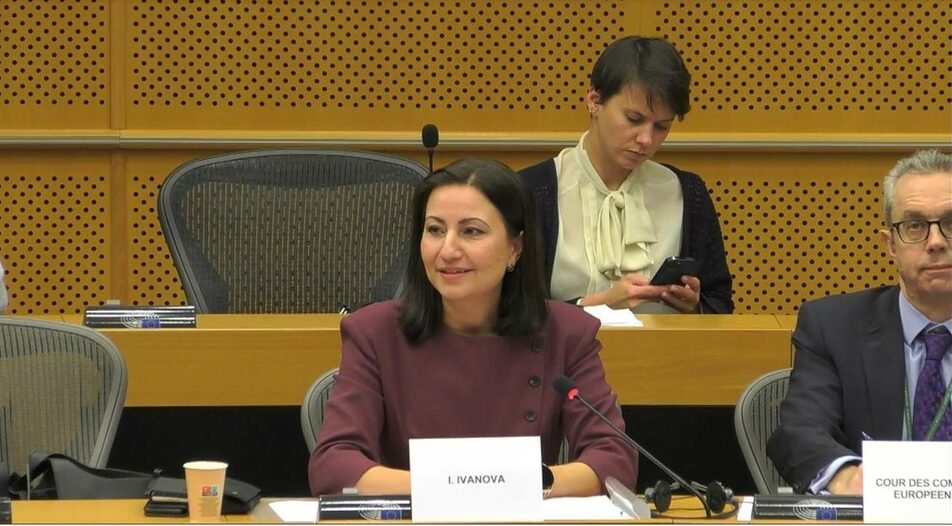Danish European Commissioner Margrethe Vestager is leaving the European Commission in September to head the European Investment Bank, or at least that's has been mooted of late. Vestager, who is currently the vice-chairman of the digitalization commission, is vacating the department and among the names being discussed around the Brussels sidelines for taking over part of the digital portfolio is Bulgarian candidate Iliana Ivanova.
Without a doubt, a woman for the next commissioner
The talk in Brussels is that Ursula von der Leyen was well aware of the imminent departures of Vice-President Margrethe Vestager and Commissioner Mariya Gabriel from the European Commission. In a letter sent to Prime Minister Nikolay Denkov, she asked for two candidates - a woman and a man. However, it appears that the outcome of this match was pre-determined and the female candidate was preferred in order to maintain the gender balance in the commission so important to von der Leyen.
The intrigue doesn't end there. When Mariya Gabriel, until recently Commissioner for Innovation, Scientific Research, Culture, Education and Youth, vacated the seat to join the new Bulgarian government, her functions (related to digitalization) were delegated to Margrethe Vestager. At the moment, Vestager, in addition to the digital transition, is also responsible for "competition" at the European Commission, which gives her the authority to monitor all mergers and acquisitions of companies in the EU.
After several months of speculation and conjecture, she officially announced that she is entering the race for the top position at the EIB: "I am glad that the Danish government is discussing my name as a possible candidate for the position of president of the European Investment Bank." After the departure of Vestager (which is expected in September), it seems that the portfolio of digitalization remains largely vacant.
Thus, the Bulgarian candidacy of Iliana Ivanova (although without sufficient experience for this key portfolio), who is expected to replace Gabriel, is among the figures touted to take on a more important role for the digitalization of the continent. The new Bulgarian European Commissioner may have to join efforts to deal with business resistance to the extensive, detailed and controversial digital legislation. Of course, that is if she successfully passes the EC appointment procedures.
Pursuing positions in the commission
This is indeed a delicate transition point for the European Commission. A premature departure of two women (one of them a vice-president) with important portfolios will be a serious challenge for von der Leyen, at a time when she is on the brink of her own bid to lead the European Commission for a second term. Although she has not yet officially made a final decision on whether to run again, she has the support of the German government. Of course, Manfred Weber, currently chairman of the EPP, bruised by his last failed attempt to head the commission may try to run again.
At the same time, one of Von der Leyen's deputies - European Commissioner Thierry Breton - has already mentioned that he would not mind being a reserve for the race for the highest position in the EU (which would not be the first time - von der Leyen also became the boss of the European Commission from the reserve).
The opportunity for the Bulgarian European Commissioner to take over a larger part of the digital department is happening at a crucial moment. The European Union's main package of digital legislation will come into force in stages over the coming months. The most significant legislative changes for social media and big tech companies relate to the new Digital Markets Act (DMA) as well as the Digital Services Act (DSA). Their goal is to limit the influence of large American technology giants such as Google, Microsoft, Apple, but the extremely detailed new rules will inevitably affect European companies too.
Since 2021, the EU has adopted more key files related to the sharing of data from businesses (Data Act), Cybersecurity Act, Artificial Intelligence Act, each of which is still too bureaucratic, difficult to understand and put into practice by local companies.
But the companies are ready to strike back. German Zelandoo was the first European business to take the commission to court over the new regulations. This example was also followed by Amazon last week again for "unfair isolation and being forced to fulfill onerous administrative duties" compared to other large retailers in the EU.
Danish European Commissioner Margrethe Vestager is leaving the European Commission in September to head the European Investment Bank, or at least that's has been mooted of late. Vestager, who is currently the vice-chairman of the digitalization commission, is vacating the department and among the names being discussed around the Brussels sidelines for taking over part of the digital portfolio is Bulgarian candidate Iliana Ivanova.












